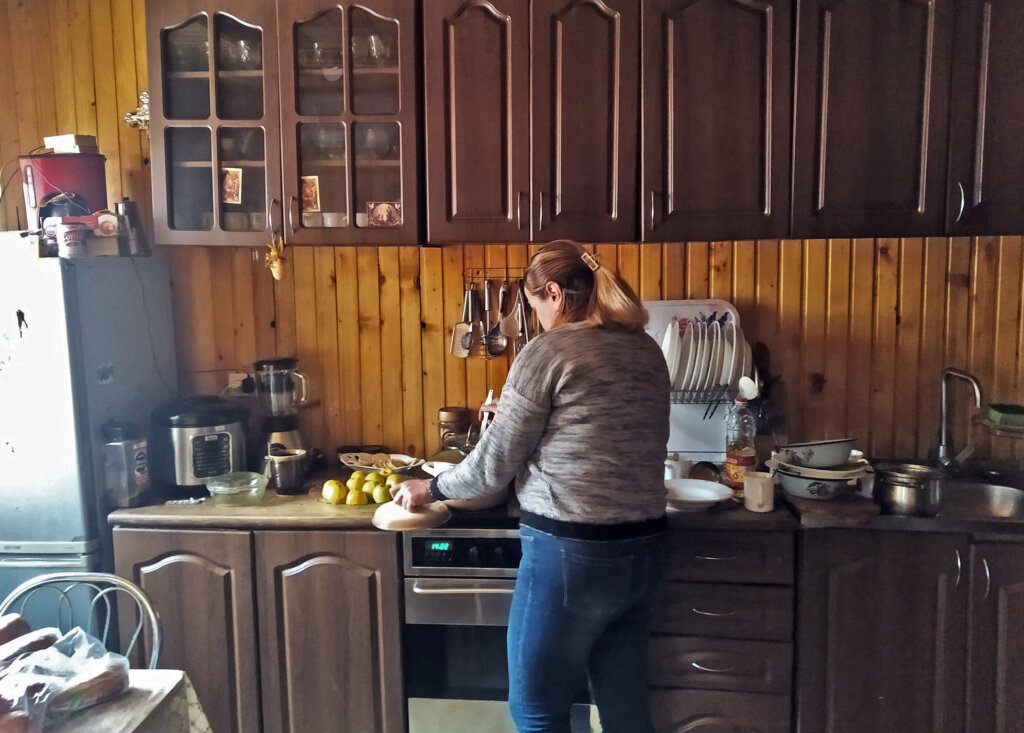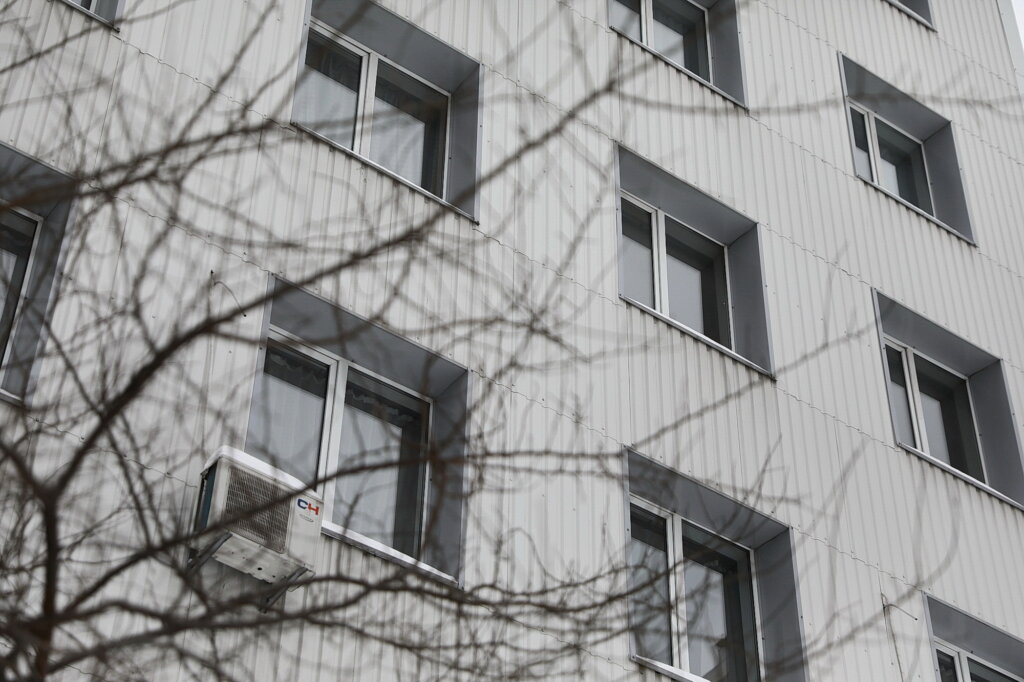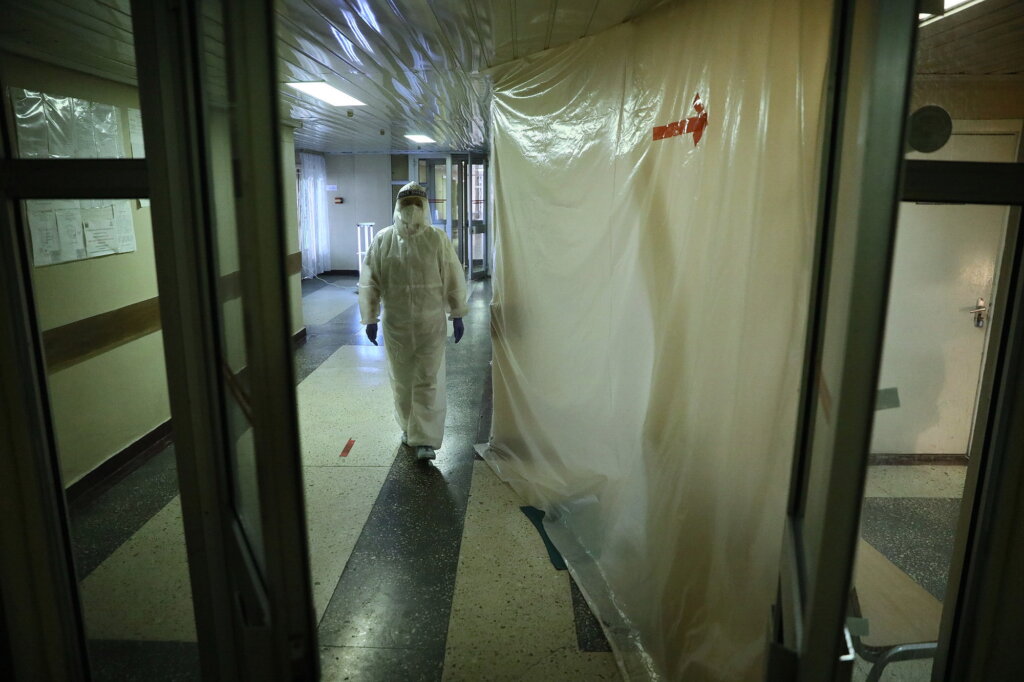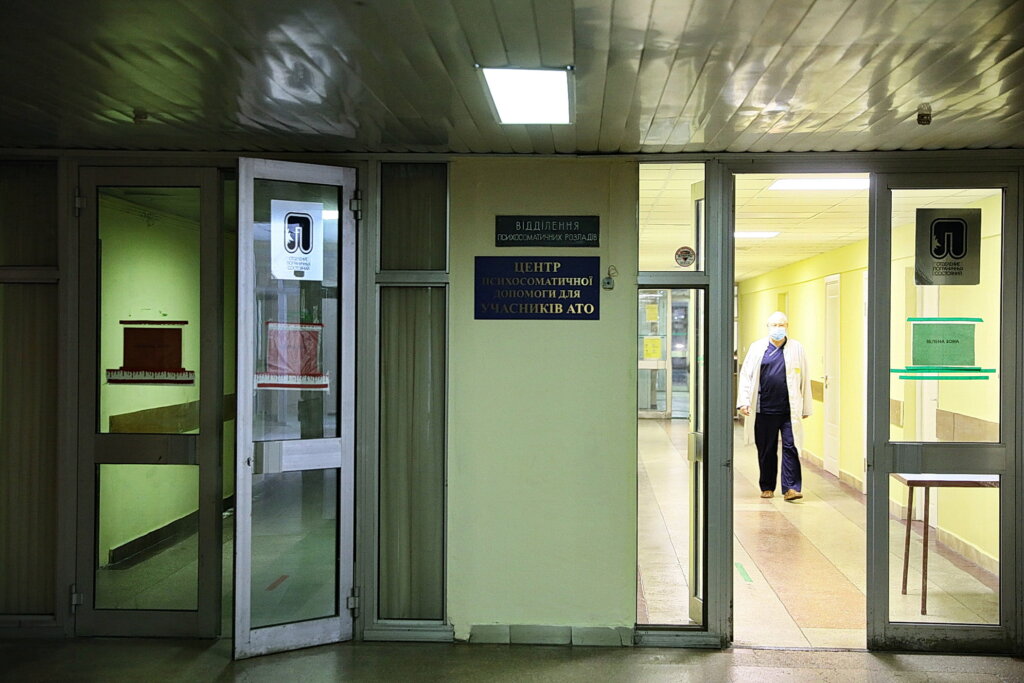Coronavirus changed the life of 39-year-old cook Marta Savchin. She can now only guess how her dishes smell and taste.
Savchin, a native of Bili Oslavy, a village in Ivano-Frankivsk Oblast 600 kilometers west of Kyiv, has been struggling to regain her most vital working tools — smell and taste — for eight months and counting, with no success.
“I used to enjoy the smell of bread. I used to bake Easter cakes,” Savchin said of the time before she caught the virus. “Now I am shoving that cake into the oven and I do not feel how it smells.”
But there was another consequence of the disease.
Soon after recovering from COVID‑19, Savchin said, she started feeling the disease took away her taste for life.
“I just did not want to live,” she told the Kyiv Post. “I asked myself: ‘What am I living for?’ But then I looked at my children and thought: Who will take care of them if not me?”
Haunted by suicidal thoughts, insomnia and auditory hallucinations, Savchin saw a psychotherapist in October. He diagnosed her with COVID-triggered depression and prescribed antidepressants.
Soon after the pandemic hit the world in December 2019, scientists sounded the alarm about the devastating effect COVID‑19 has on the mental health of patients.
The terms “long COVID” and “post-COVID condition” soon emerged. They describe various long-term effects of coronavirus on the heart, lungs and mental health.
One in five COVID‑19 patients develop mental illness within two months after getting infected, the scientists of Britain’s Oxford University revealed in November 2020.
Anxiety, depression and insomnia — the same effects that Savchin experienced — were most common among recovered COVID patients who developed mental health problems, according to the study.
The prescribed antidepressants worked for Savchin, stabilizing her mental health. She started sleeping well, her depression abated and her suicidal thoughts faded away.

Marta Savchin, a 39-year-old professional cook from Bili Oslavy, a village in Ivano-Frankivsk Oblast, is cooking in her kitchen. She feels no smell and taste of her dishes as she lost these senses back in June 2020 and has not regained them since then. (Kyiv Post)
Yet some other coronavirus patients were less fortunate. At least 10 COVID‑19 patients have killed themselves in Ukraine since June 2020, according to media reports. Almost all of them did it in hospital wards.
Doctors who spoke to the Kyiv Post link their patients’ suicides to coronavirus-caused mental issues.
The suicide wave started in Zaporizhia, a city in southeastern Ukraine, and went all the way through Dnipro and Kharkiv to Kyiv, the capital.
Numerous similar cases have been reported in India, Philippines, Albania, Pakistan and other countries.
The rest of the world turned out to be just as unprepared for the coronavirus-triggered “deaths of despair” as Ukraine.
Countries launched psychological support hotlines for people struggling with mental health issues amid the pandemic. In Ukraine, a support network was created by volunteers.
Meanwhile, authorities did little.
Ukraine’s Ministry of Health sent no instructions to hospitals on how to react if coronavirus patients show symptoms of depression or express suicidal thoughts. The ministry hasn’t responded to Kyiv Post’s request for comment by the time of publication.
But some hospitals developed suicide prevention protocols on their own initiative. They did so, however, only after patients jumped from their windows.
‘We removed handles from windows’
After two coronavirus patients jumped to their death from the window of the intensive therapy unit of the 4th Clinical Hospital in Kyiv in September, the administration realized they needed to react.
The hospital removed handles that opened the windows, and installed bars.
“Only using a special key, hospital staff can now crack the window for ventilation,” Deputy Chief Medical Officer Georgiy Aksutin told the Kyiv Post.
After the incident, a staff psychologist has started checking on all the coronavirus patients. She worked in the hospital for years, but her major task was to prepare patients who survived stroke or AIDS for release from the hospital.
After the hospital was repurposed for treating coronavirus patients, the psychologist did not have much work until the suicides happened. Now she is busy.
“Neither of those two patients was registered with a psychiatrist,” Aksutin said, “So this caught us by surprise.”
According to Aksutin, the hospital has previously seen suicides by patients with cancer or mental disabilities but these were very rare. It had never happened in the intensive care unit or among coronavirus patients.
It was 7 a. m. on Sept. 21 when a nurse took samples from the patients including 68-year-old Valentyn. The hospitals do not reveal the full names of their patients to protect their identities.
As Valentyn’s family waited for the samples outside the building, he jumped from the second floor to his death.
“Suddenly the patient got out of bed, took off his face mask, rushed to the window, opened it, and the nurse ran to him to stop him,” Aksutin said.
“He grabbed a metal object — a special ruler for measuring blood pressure — and began to fight with a nurse,” the doctor continued. “She tried to grab him, pull him away, and he is a big man, but he threw himself out the window.”
According to Aksutin, the patient shouted: “They were waiting for me there.”

A coronavirus patient jumped out of the window of Kyiv’s Hospital No. 8 on Oct. 20, 2020. On the next day, another patient jumped out of the very same window. Both died immediately. (Oleg Petrasiuk)
Three other patients in the hospital ward, all on invasive lung ventilation, witnessed this. One of them, 42-year-old Viktor, started feeling depressed soon after.
The staff psychologist did not see him. The doctors, however, gave him adaptogens, herbal pharmaceuticals for counteracting stress.
Early the following morning on Sept. 22, Viktor fatally jumped out of the same window shouting the same phrase, according to Aksutin. He is survived by his wife, doctors said.
Valentyn’s and Viktor’s hospital beds were next to each other. They were able to communicate between invasive ventilation sessions. Both had pneumonia, a common coronavirus complication.
Their suicides did not make other hospitals take preventive measures.
One month later yet another two coronavirus patients jumped out of the windows of Kyiv hospitals.
A wave
Sixty-year-old Larysa killed herself first.
On Oct. 19, she jumped from the window of the fourth floor of Oleksandrivska hospital in central Kyiv.
Larysa was admitted to the hospital with severe coronavirus symptoms. She had pneumonia and damage to her kidneys and adrenal glands.
Her condition soon worsened and the doctors transferred her to the intensive care unit, where she stayed for almost three weeks.
A few days after the doctors had managed to stabilize her condition and transferred her back to the general infection unit, she ended her life. It happened in the early hours of Oct. 19 when everyone but her neighbor was asleep.
“She went out into the hallway, opened the window, stood on the windowsill, and…(jumped),” said Oleksii Kutsenko, the head of the Department of infectious resuscitation.
“It was completely unpredictable. No one could have even imagined, you know? Especially since we have not had such cases before among coronavirus patients,” he said. Larysa was not registered to see a psychiatrist to his knowledge.
The suicide was hard to prevent, Kutsenko said. According to him, the hospital was overcrowded in October. There were twice as many patients as the hospital can accommodate and additional beds were used. The staff was unable to give everyone their undivided attention.
“If the patient is seriously ill, then all the doctors are near him. And all the rest? Now there is no supervision,” Kutsenko said.
When Kutsenko learned that Larysa ended her life he was “shocked.”
“She was so sick, we brought her back (from the dead) and there you go. All that work down the drain,” he said.
Larysa’s daughter Tetyana, 36, does not believe her mother jumped out of the window because of coronavirus-caused mental issues like the doctors say and is barely coping with her loss. Her mother was “the closest person,” to her, she told the Kyiv
Post and declined to discuss it further.
The hospital, however, cannot guarantee they will be able to prevent every suicide in the future. Kutsenko said they do not have the resources to do something about it.
A unit for covid patients in depression
The day after Larysa jumped out of the window, 68-year-old Vasyl did the same on the other side of Kyiv, in the 8th Clinical Hospital. He died immediately.
On Oct. 20 at around 9 a. m. Vasyl asked his neighbor to leave their two-bed ward because he wanted to breathe some fresh air.
“And when the patient returned back to the ward after some time, his neighbor was gone,” said Serhiy Vetrov, head of the Psychosomatic Disorders Department.
Vetrov was asked to provide psychological help to Vasyl’s ward mate, who has been suffering from anxiety and depression after Vasyl’s death.
“This was unexpected for this patient, too,” said Vetrov. “According to him, nothing foreshadowed that he wanted to do it,” the doctor added. Vasyl did not have any preexisting psychiatric conditions.
After the incident, the hospital’s administration decided to launch a special unit for patients, who developed mental health problems due to COVID‑19.

A medical worker in a protective suit walks in the red zone, where COVID-19 patients are treated, in Kyiv’s Hospital No. 8 on Feb. 10, 2021. This unit is for COVID-19 patients who developed mental health issues. It was launched in October 2020 after four coronavirus patients killed themselves in Kyiv hospitals. (Oleg Petrasiuk)
Its capacity is 20 beds and it’s now one-third full.
Vetrov is in charge of the unit. According to him, 46 patients were treated there since October and 163 more received psychological consultation.
“If something goes wrong and we cannot cope with these patients, then we arrange a transfer to a psychiatric hospital,” Vetrov said. There have been several transfers so far.
However, if two out of three Kyiv hospitals were able to address this challenge it is unlikely the smaller hospitals in more remote areas across Ukraine will be able to do the same.
How COVID-19 damages the brain
All three doctors who spoke to the Kyiv Post agree that coronavirus can heavily affect the vessels of the brain, causing brain damage.
“Can this lead to emotional distress? Absolutely. There are anatomical structures in the brain that are responsible for our emotions. Many patients describe their emotional state as an overwhelming level of anxiety, uncontrollable tears, ideas of self-blame,” Vetrov said.
“And if you do not provide a patient with assistance in time, all this, in the end, can lead to suicidal thoughts, and in the future, to suicidal behavior,” he went on.
There are several reasons for COVID‑19’s mental health impact, the doctors said.
One is the virus’s neurotoxicity or damage to the central nervous system. According to Kutsenko, as of today all five of his patients in the intensive care unit have some brain damage caused by coronavirus.
Another reason is hypoxia, a lack of oxygen that is typical for COVID-19 patients. “How long does it take for a brain to die? Five minutes without oxygen,” said Kutsenko.
“The brain is nourished by glucose. To metabolize it, oxygen is required,” he added. Lack of oxygen causes behavioral disorders, doctors said.

Kyiv’s Hospital No. 8 is divided into red and green zones separating coronavirus patients from everyone else. (Oleg Petrasiuk)
The third reason is a psychosocial factor: panic before the unknown on a global scale.
People worry about their health and their jobs. They’re sad because they can’t meet with relatives. And they face family problems during isolation.
Seeing signs of anxiety and depression in his patients Spartak Subota, a psychotherapist, decided to launch a platform to support people struggling with psychological problems amid the pandemic.
Subota called on his colleagues to unite and help him provide free aid to people. Many agreed. In May 2020, the Tell Me project started its work. Each of its patients gets three free sessions with a psychotherapist. The specialists have offered over 15,000 hours of free consultations, according to Subota.
“Many people cannot afford psychotherapy, it is not cheap,” he said of the reason why he started the project.
“Many negative consequences of the coronavirus exist. Some people catch psychotic episodes. A very common thing now is that people’s cognitive sphere deteriorates after the coronavirus — memory, attention, thinking, speech — and the psychotic episodes begin,” he said.
“It can be accompanied by hallucinations and delusions,” he added.
This is exactly what happened to Savchin, a cook from Ivano-Frankivsk Oblast.
After recovering from coronavirus she realized that the disease has kept affecting her life. She lost 13 kilograms, not wanting to eat as long as food had no smell and taste.
She was also suffering from hallucinations and insomnia before she started taking antidepressants in October.
“I started feeling fear. I did not want to go out. It was the first time ever I was experiencing such a thing,” Savchin said.
“As I think back on it, I am trembling,” she added.
The loss of smell and taste affected her professional life, too.
“I adore cooking. I always had something ready baked or roasted, but now I do not want to cook,” she said.
“It brings no joy anymore.”
Editor’s Note: This report is part of the Investigative Hub project, within which the Kyiv Post monitors investigative reports in the Ukrainian media and brings them to the English-speaking audience, as well as produces original investigative stories. The project is supported by the National Endowment for Democracy.
